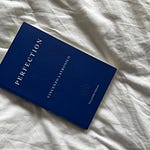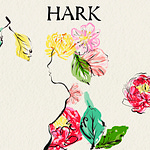On being moved
by Alice Vincent
It’s something that’s very difficult to explain, those rare moments of connection that happen when your writing chimes with something you didn’t even realise you’d been needing to express. I suppose it’s a little like cleaning a dirty window and realising the room is brighter for it. When we interviewed Thomas Morris, author of short stories including the fantastic suite Open Up, long-term editor at The Stinging Fly and one of Granta’s Best Young Novelists for the decade, he put it in a way I’ve struggled to shake since: “I picture myself kind of out in the garden with a shovel and I'm digging for feeling. And when I hit the feeling, that's when I get the shiver, kind of like it sent a jolt through me.”
We love that quote. We love that quote so much it’s the first thing you hear when you tune into the In Haste podcast (we don’t have adverts - but we do rely on your subscriptions to keep going, if you fancied a paid membership). We love it because it’s so visceral for an activity that is often quite sedentary, but we also love it because it captures the magic of when writing is really going well. Clunk, hit, shiver: something has appeared on the page or the screen and you can’t quite believe how it’s made you feel.
I haven’t been able to stop thinking about Thomas saying this because it made me marvel: he’s a fantastic author, Open Up was the best book I read in 2023, which is saying something. He spends anywhere between two and eight years on crafting a single short story, and that’s, presumably, because it takes a long time to write something that sends a jolt every time you do it.
As Charlotte and I outlined when we first breathed In Haste into being, we’ve written a lot in our time. Most of it never conjured any feeling, and that’s fair enough. Some of it, though, has. Read enough of anyone’s work and you’ll find yourself holding onto phrases or chapters or stories; they’ve struck feeling in you. What a gift.
Striking it in yourself, though, is a rarer thing. I can think of two instances of it happening, and I’ve never really spoken to anyone about it before - mostly because it seems a bit fey and indulgent, doesn’t it? To be moved to tears by your own work? Perhaps if I had envisaged myself in the garden with a shovel I’d have found it easier to express. With both, I have clear memories of writing the words. The first was in my old flat (Treehouse, to those who know - it’s where Rootbound ends and Why Women Grow begins), and it was a passage about my grandmother and how little I knew of her, really - you can read it in Rootbound. The second was writing the concluding pages of Why Women Grow, some words of which ended up being selected to go on the proof copies. In the second instance, in particular, I didn’t feel entirely in control of what I was writing; it was a case of that “flow” people talk about. It turned up, lickety-spit, and then I remember sitting back and not quite believing it was there.
For me these are the magic tricks that happen when you keep turning up to the page. I’m not a huge fan of insisting upon a daily writing practice (I write most days, because I have a lot of deadlines, but I wouldn’t if I didn’t), but I do think that sometimes you’ve just got to turn up and dig. When you’re least expecting it, you’ll hit upon gold.

















